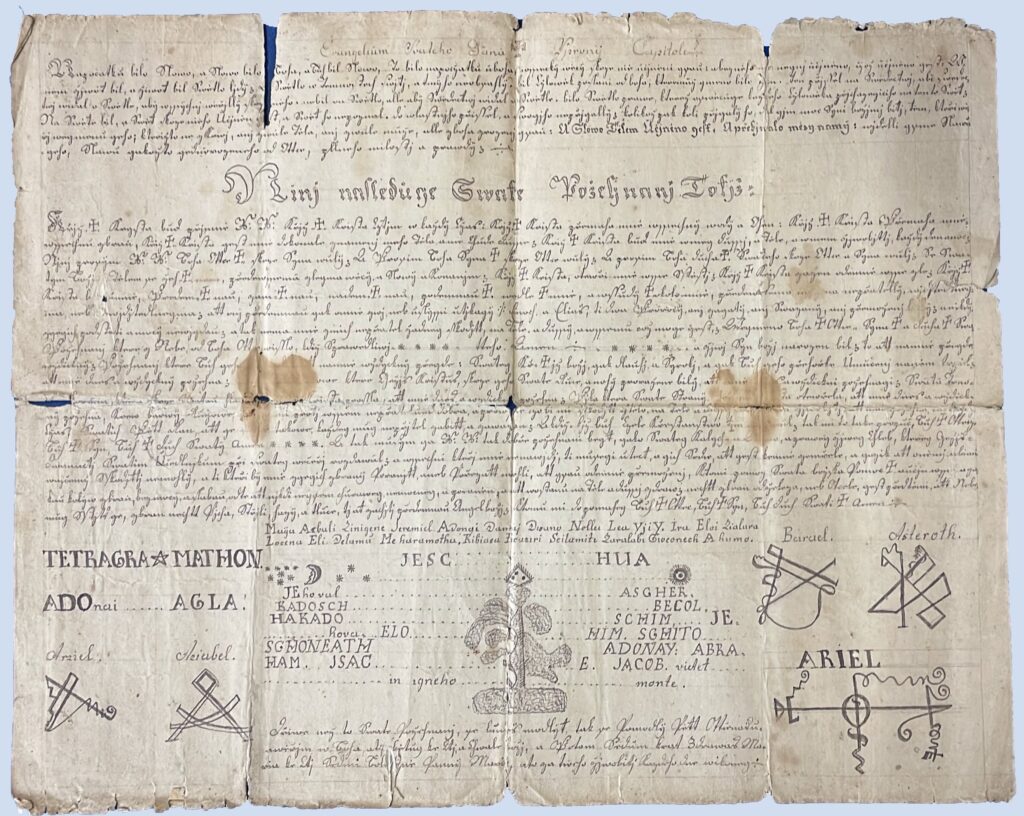In 1938, the Prague Castle’s chambers witnessed an unlikely scene: the Czech President welcomed a delegation of occultists from an occult society Universalia who came to offer help fighting the Nazis. They proposed a supernatural solution for the country by ‘creating a magical cluster or charge of Saturnic powers which will be prepared in all strategic places. When the enemy’s army steps on any one of them, it will fall asleep’.[1] The President, however, refused their offer, relying instead on military help from France. Hence, the occultists decided to act on their own and eventually conducted several magical attacks against the Nazi army and Hitler himself in the hope of saving their country’s future.
Occultists conducted magical rituals and wanted to augment human abilities by using esoteric teachings and practices, studying astrological charts, or trying alchemical experiments. They studied ancient texts and cultures. Some wanted to edify society to a higher state of consciousness, while others utilised occultism to explain and vindicate social inequality.

Occultism emerged in the mid-nineteenth century across the world. There were two fundamental impetuses for its rise. Firstly, occultism emerged as a peculiar religious reaction to modernity and modern society. Secondly, European discoveries in the Orient––from Buddhism to various esoteric teachings and practices––shaped local occult groups. For some Europeans, the Orient was the source of all esoteric knowledge. This idea was not welcomed by some other groups that asserted the opposite: Christianity and the West are the true sources of esoteric wisdom.
The Occult Bohemia project focuses on the Czechoslovak occult milieu between 1890–1945. Its main task is to research the relations between occultism and politics through the example of the Czechoslovak occult groups. Notably, the project studies connections between ethnicity, nationalism, and esoteric ideas and practices. It considers the local Czech(Slovak) perspectives and occult milieu; however, these are not separated entities and the research considers them in a wider framework of Central European networks and relations. Hence, the project also take into account Austrian, German, or French occultism as since these influenced the Czech(oslovak) one the most. The Czechoslovak occult milieu is an excellent case upon which we can study the occult milieu in the so-called Slavic countries. One reason for that is the geographical place of the milieu–Prague is in the heart of Europe–wherein influences from both west and east converge.
The Occult Bohemia project contributes to the recent scholarship in three ways: Firstly, it sheds new light on the role and impact of the ‘Slavic’ occultism in Central Europe and thus helps to understand local nationalisms and entangled histories and nationalisms of the region. Secondly, it aims to rethink the relations between alternative religion and politics. Lastly, it fills a gap within the study of esotericism and finally introduces Czechoslovak occultism to the international audience.
The Occult Bohemia (acronym OCCULT-NATION) is an MSCA-PF project funded under Horizon Europe.
[1] Martin Jůna, Jan Kefer: Hermetik s českým srdcem, 1st ed., Život českých hermetiků (Jindřichův Hradec: Martin Jůna, 2019).